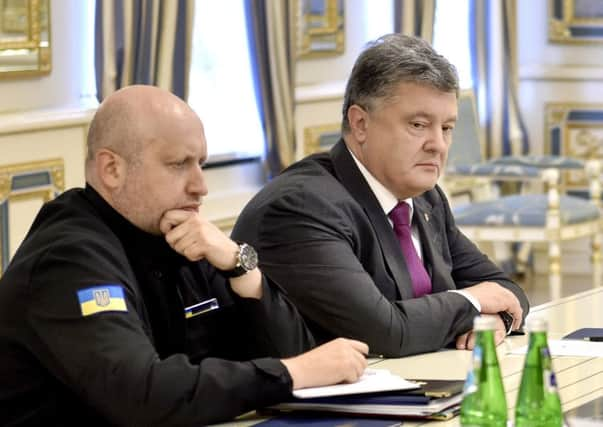Ukraine forces come under attack as peace accord threatened


As an indication of the increased anxiety over the risk of a return to full-scale war, Germany urged Russia and Ukraine on the same day to calm tensions and keep the peace agreement, known as the Minsk accord, in place.
Berlin’s pleas came on a day Kiev reported dozens of attacks on its troops in eastern Ukraine. The government said Ukrainian positions along the volatile front line had come under sniper, machine gun and artillery attack from enemy positions, and also claimed the rebels had used heavy weapons, such as self-propelled guns, banned under the Minsk accord.
Advertisement
Hide AdAdvertisement
Hide AdAlthough Ukraine reported no casualties the large number of the apparent attacks could well fuel the rising tensions between Kiev and Moscow.
Last week Vladimir Putin accused Ukraine of “terrorist” attacks in Ukrainian Crimea, which Russia annexed in 2014, in an attempt to provoke a conflict over the disputed region. Moscow said two security personnel were killed as they helped thwart an attack by alleged Ukrainian “saboteurs” intent of launching a bombing campaign in Crimea. Kiev denied any involvement while also claiming that Moscow had now massed 40,000 troops on its border with Ukraine and in Crimea.
In the wake of the alleged incident, Petro Poroshenko, the Ukrainian president, put the country’s armed forces on high alert.
Frank-Walter Steinmeier, the German foreign minister, said it was urgent that all sides stepped back from conflict.
“In recent days there has been a spike in tensions around Crimea and that has worried us,” he said after a meeting with Sergei Lavrov, his Russian counterpart. “The main thing is that the situation doesn’t get out of control. We call on everyone to de-escalate.”
Mr Lavrov said it was important that both sides avoided succumbing to “emotions”.
“For now the main thing is not to give in to emotions, not to slip into taking some extreme actions but to try to stabilise the situation with restraint and concentration,” he stressed. He added that “Russia is set to influence the leaders of People’s Republics of Donetsk and Luhansk [rebel controlled areas in eastern Ukraine] to conduct a productive dialogue about the Minsk peace process”.
Mr Lavrov also scotched fears that Moscow could sever diplomatic relations with Ukraine owing to the alleged saboteur attack, saying it was not in Russia’s interests to break off relations with its neighbour.
Advertisement
Hide AdAdvertisement
Hide AdThe spike in both violence and tension in eastern Ukraine have exemplified the fact that the conflict in the war-torn region remains far from resolved and still casts a long shadow over European security.